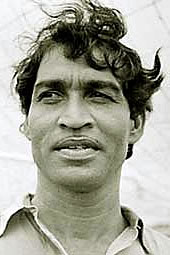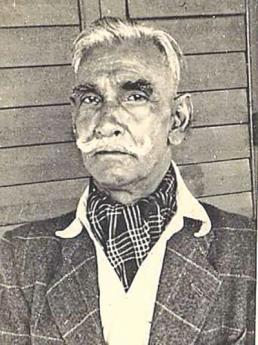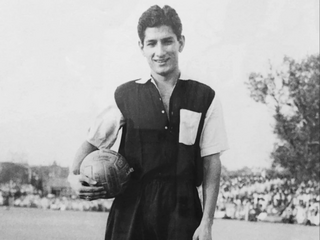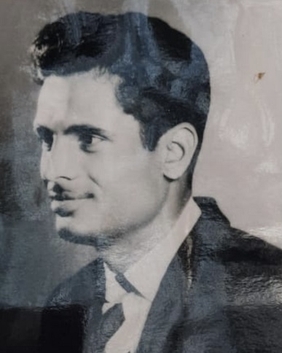Subhash Bhowmick was an Indian football player and manager. During his playing career, he represented the "Big Two" of Kolkata football, East Bengal and Mohun Bagan. He also represented India in various international tournaments between 1970 and 1985.

Mohammed Salim, nicknamed "the Indian juggler", was an Indian footballer from Calcutta, which at the time was part of the British Raj. He played predominantly as a defender. Salim was best known for his role in the fabled 1930s Mohammedan SC team which claimed five successive Calcutta Football League titles. He also became the first player from the Indian sub-continent to play for a European club, Celtic FC.

Syed Nayeemuddin, known as Nayeem, is an Indian football coach and former player. He played for and captained the India national team. He later managed Mahindra United, Brothers Union, Dhaka Mohammedan, and Bangladesh national team.

Havildar Peter Thangaraj was an Indian football player and a non-commissioned officer in the Indian Army. Thangaraj played for the Indian national side at the 1956 Melbourne and 1960 Rome Olympics. He was voted Asia's best goalkeeper in 1958. Thangaraj was a recipient of Arjuna Award for the year 1967.

Mohammedan Sporting Club, commonly referred to as Mohammedan, is an Indian multi-sports club based in Kolkata, West Bengal. The club is best known for their professional men's football section which competes in the Indian Super League, the top of the Indian football league system, as well as Calcutta Football League (CFL), the oldest football league in Asia. Formed in February 1891, it is one of the oldest active football clubs in the country. Mohammedan is first Indian club to win the Durand Cup, also the first Indian club to win a overseas tournament.
Amal Dutta was a former Indian footballer, coach and football manager. Born in Calcutta, then Bengal Presidency, he is considered as the first professional football coach in the country. A finest thinker of the sport, Dutta had a rivalry with Pradip Kumar Banerjee during his coaching days in Kolkata club football.

Dalhousie Athletic Club is an Indian professional sports club based in Kolkata, West Bengal, best known for its football section. It was established in 1880, during the British rule in India. Dalhousie has competed in the Premier Division of Calcutta Football League for a long time.

Aryan Football Club is an Indian professional multi-sports club based in Kolkata, West Bengal, known predominantly for its association football section. The club competes in the Calcutta Football League, oldest league in Asia.

Moosa Ghazi was a Pakistani footballer who played as a left winger. A former captain, Ghazi represented the Pakistan national football team in the 1960s, and was member of the national squad which finished finalists at the 1962 Merdeka Tournament. Considered as one of the earliest legends in Pakistan football history, he was renowned for his performances at the wing and goalscoring abilities.

The West Bengal football team, also known as IFA Bengal football team or earlier the Bengal football team, is an Indian football team representing West Bengal in Indian state football competitions including the Santosh Trophy. They were the second Indian team to participate in the continental top tier tournament – Asian Champion Club Tournament, by playing in the 1970 edition following Mysore in 1969.

Football is one of the most popular sports in Kolkata, West Bengal. East Bengal, Mohun Bagan and Mohammedan are the heart of Kolkata football. The rivalry between Mohun Bagan and East Bengal, originating from the Calcutta Football League as the Kolkata derby, is one of the fiercest in the world and considered among the flagship events in the Indian footballing calendar. Kolkata is known to be the Mecca of Indian football, with the two most supported teams in the city of Kolkata – Mohun Bagan and East Bengal, whereas Mohammedan Sporting having a pan India fan base. The city is also home to the biggest football stadium in India, the Vivekananda Yuba Bharati Krirangan, which as of 2015 has a capacity of 85,000. The record attendance of 131,781 came in a match between the said two teams in the semifinal of the 1997 Federation Cup.
Mohammed Habib was an Indian footballer who played as a forward for the India national team which he also captained. He is also considered by many Indians as one of the best footballers the country has ever produced. He was popularly known as Bade Mia in the Indian football world.

Syed Abdus Samad was an Indian football player from Bengal. Dubbed "Football Jadukor", he played for India national football team in 1924 and captained it in 1926. He played as a forward.

Masood Fakhri was a Pakistani professional footballer who played as a left winger. A former Pakistani international, Fakhri was well known for his time with Indian Kolkata clubs East Bengal and Mohammedan. He was the first Pakistani football player to score a hat trick in an international game, and the first player from South Asia to play in England, where he played for Bradford City before retiring.
Sheikh Abdul Latif was an Indian footballer. He participated at the 1952 Summer Olympics, 1956 Summer Olympics and the 1960 Summer Olympics, with Syed Abdul Rahim managed India. In 1959–60, he captained the national team.

Hussain Ahmed was an Indian footballer. He competed in the men's tournament at the 1956 Summer Olympics. He played for the Hyderabad City Police team in the 1950s, as well as taking part at the 1958 Asian Games and the Merdeka Tournament in 1959.

Mohammad Rahmatullah was an Indian footballer who played as a forward, and manager.

Balai Dey is an Indian former footballer who played as a goalkeeper. He is one of the few footballers who represented the two nations, India and Pakistan, in international football.

Association football is two most-popular sports in West Bengal, the others being Cricket. East Bengal, Mohun Bagan and Mohammedan are the heart of West Bengal football. The rivalry between Mohun Bagan and East Bengal, originating from the Calcutta Football League as the Kolkata derby, is one of the fiercest in the world and considered among the flagship events in the Indian footballing calendar. West Bengal is known to be the Mecca of Indian football, with the two most supported teams in the country being based within the city – Mohun Bagan and East Bengal.

Osman Jan was a footballer who played as a goalkeeper. Jan is regarded as one of the greatest goalkeepers in the Indian subcontinent during the 1930s and 1940s. With a short height measuring 5'6", Jan was praised for his long-range leap and a powerful fist. He was also renowned for his outfield play mind and one-on-one situations.

















